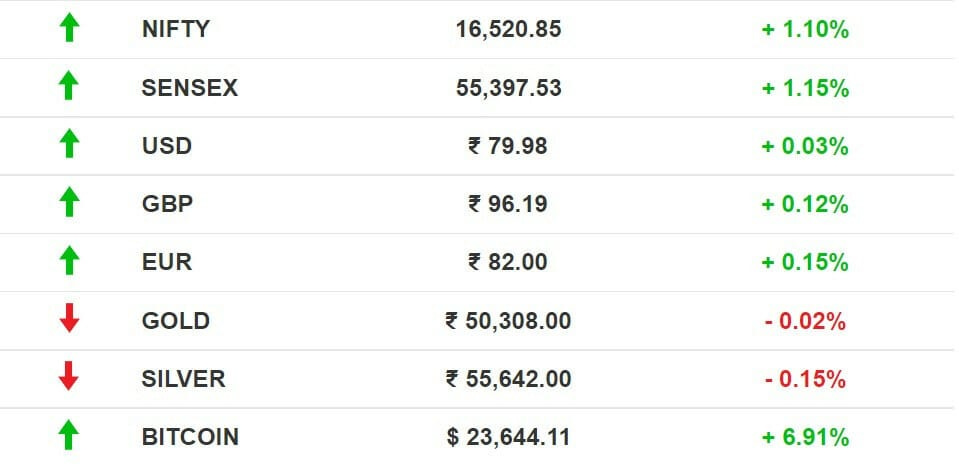Whistle Podu goes global
Also in today’s edition: Grasim bets on online infra; Retail giants sweat over inflation; Social media cos branch out; Musk plays catch up
Good morning! Justin Bieber is coming to town. Again. He will resume his Justice World Tour, after being diagnosed with Ramsay Hunt syndrome, which left his face partially paralysed. The first time around, fans were disappointed with his lip-syncing. We are hoping the second time's the charm.
If you enjoy reading us, why not give us a follow at @thesignaldotco on Twitter and Instagram.
The Market Signal*

Stocks: The government removing windfall gains tax on fuel exporters boosted sentiment in Indian markets. ONGC and Reliance Industries got a quick boost. IT companies joined the party despite Wipro reporting a dip in June quarter profit.
Early Asia: The SGX Nifty perched 0.05% higher than its previous close at 7.30 am India time. The Hang Seng Index (-1.00%) and Nikkei 225 (-0.21%) shrunk.
INFRASTRUCTURE
Grasim Forays Into Digital B2B

Aditya Birla Group’s flagship company, Grasim, is setting foot in the B2B digital marketplace for building materials, with an investment of ₹2,000 crore over the next five years.
Rationale: India's biggest cement producer, UltraTech, is a subsidiary of Grasim. It also makes concrete, insulators and other infrastructure items. Grasim recently doubled the outlay (₹10,000 crore) for its decorative paints business. With a digital presence, Grasim can potentially crack the online building materials market (which has only a handful of players such as Infra.Market), and manage its procure-to-pay process seamlessly. The development interestingly comes after the Adani Group’s blockbuster acquisition of Holcim.
FYI: This is not the conglomerate’s first e-commerce gambit. In 2015, it launched online fashion store abof.com (all about fashion), but that didn’t pass muster with the market.
RETAIL
The Devil’s In Retail
Hindustan Unilever CEO Sanjiv Mehta has checked inflation and market conditions as the company’s enduring concerns and pitched for the country to use forex reserves to stop the rupee fall. A falling currency makes imports (palm oil, for instance) used in FMCG products expensive and consequently raises the label price.
Rival Godrej has flagged another concern—reduced customer incomes are crimping discretionary spending which, in turn, is the fuel for FMCG growth.
Workaround: Throw in the inflationary GST on a range of consumer goods, and the concerns multiply. But it’s not for nothing that we are known as masters of jugaad. Companies are increasing the package weight of goods such as flour because the tax applies to packaged flour up to 25 kg! Kiranas can rip up the sacks and sell in smaller quantities. It’s all in the details, you see.
BUSINESS OF SPORT
IPL Owners’ Overseas Shopping Spree

We’d told you about Kolkata Knight Riders’ (KKR) global ambitions. Now, other owners of the Indian Premier League (IPL) are following suit. An ESPNCricinfo report revealed that all six franchises of the soon-to-be-launched South African T20 league were snapped up by IPL team owners. That’s big.
Who, who?: Brace yourselves for… the Johannesburg Super Kings (Chennai), Cape Town Indians (Mumbai Indians/Reliance), Durban Super Giants (Lucknow), Sunrisers Port Elizabeth (Hyderabad), Paarl Royals (Rajasthan), and Pretoria Capitals (Delhi).
Beyond SA: At least three IPL franchises have acquired teams in the Caribbean Premier League (CPL): Trinidad (KKR), Saint Lucia (Punjab Kings) and Barbados (Rajasthan Royals), while others have looked at UAE’s International League T20. Delhi Capitals co-owner GMR is also looking to pick up teams in Australia or England.
(For those wondering about our subject line…this is what we’re talking about.)
The Signal
IPL owners have been looking at a global franchise opportunity for sometime now. The Rajasthan Royals, for instance, tried to cobble together a cross-country franchise back in 2010. Vijay Mallya too picked up a CPL team in 2016.
Beyond revenue opportunities, two clear reasons come to mind: one, brand extendibility in newer markets all year round, since the IPL has a specific window. Two, the opportunity to create a feeder pipeline for high quality international uncapped talent through these countries for their respective IPL franchises.
Beyond cricket, the Manchester City owners are taking a similar approach through City Football Group, which has bought clubs in 10 countries, including India (Mumbai City FC).
🎧 IPL has gone international.
SOCIAL MEDIA
Social Media Is Marking New Territories
Social media platforms have their finger in every pie.
Exhibit A: Google's Prabhakar Raghavan probably won't like this bit of news. Last week, he admitted TikTok and Instagram were a threat to Google. Now, Instagram is launching a searchable map for users to discover popular locations. YouTube wants you to shop from its platform.
Snapchat is taking on pandemic-darling Zoom, by launching its web version for paid subscribers; it's also thrown in a chat and video call feature on the desktop version. In related news, brace yourself for spam at the workplace: Microsoft wants to shake up the workplace by bringing video stories to Teams.😖
To sum up: That tech cos are weaning from their core businesses is a no-brainer. Newer avenues equal more revenue streams to add to the billions.
🎧In a strategic business move, tech companies are diversifying from their core businesses.
MUSKVERSE
Small Step For Musk, Giant Leap For Competitors

The former lumberjack who oversaw the propulsion division of SpaceX for over a decade is now set to overtake his alma mater. Tom Mueller—who left Elon Musk’s spaceflight company to establish Impulse Space—is joining hands with Relativity Space to launch the “first-ever” private Mars mission. Neither Relativity nor Impulse have ever launched a rocket, but the duo is confident about heading to the red planet in 2024.
Playing catch-up: Another Muskverse alumnus is helping shape the course of a rival brain-computer interface startup. Neuralink’s former president Max Hodak is now an investor in Synchron, which implanted its first device, called a stentrode, in an American patient—all while Neuralink awaits FDA approval for human trials. We wonder if there’s a Boring Co. competitor waiting to pull an Impulse-Relativity and a Synchron.
FYI
Fined: Who would pay $50 million for laptop keyboards? Apple. It paid that much in fines for the bad keys but without admitting they were faulty.
At last: Ranil Wickremesinghe is Sri Lanka's new President and will likely remain in charge until 2024. In the UK, Rishi Sunak is leading the race to replace Boris Johnson.
Let us behave: An uber lobby of US tech companies such as Google, Amazon, Meta and Twitter is pressuring India to allow self-regulation instead of imposing government rules.
Bankrupt: Future Retail, the OG of organised retail chains in India, has formally slipped into insolvency, with the NCLT appointing a resolution pro to oversee the process.
Easy pass: Japan, Singapore, and South Korea have the most powerful passports, with access to over 190 countries. The Indian passport is a distant 87 in the index; Afghanistan’s passport is the least powerful.
Exchanged: Tesla dumped 75% of its Bitcoin holding for fiat currency in the second quarter. It also reported its first-ever quarter-over-quarter decline in profit.
Hits: YouTube India has collected over $1 billion in annual revenues, mostly from ads.
FWIW

New day, new beginning: It's official. Quidditch doesn't want to associate with the game's creator, JK Rowling. Three governing bodies have now rechristened it, *drumroll* quadball. Reasons: Rowling’s “anti-trans” views, and the fact that “quidditch” is trademarked by Warner Bros. Fair enough.
Talking about names…: Mark Zuckerberg's Meta is being sued by a company of the same name. MetaX LLC, an installation-art company, claims that rebranding has diminished its business. Truly meta.
Bad rap: This isn't a good look for Jackie Chan. There's news coming in that shooting for his production was filmed in war-torn Syria. According to reports, the movie is inspired by China's 2015 evacuation of its citizens during the Yemen war. But Yemen didn't make the cut since it was deemed dangerous. Activists are understandably livid.
Enjoy The Signal? Consider forwarding it to a friend, colleague, classmate or whoever you think might be interested. They can sign up here.
Want to advertise with us? We’d love to hear from you.
Write to us here for feedback on The Signal.



